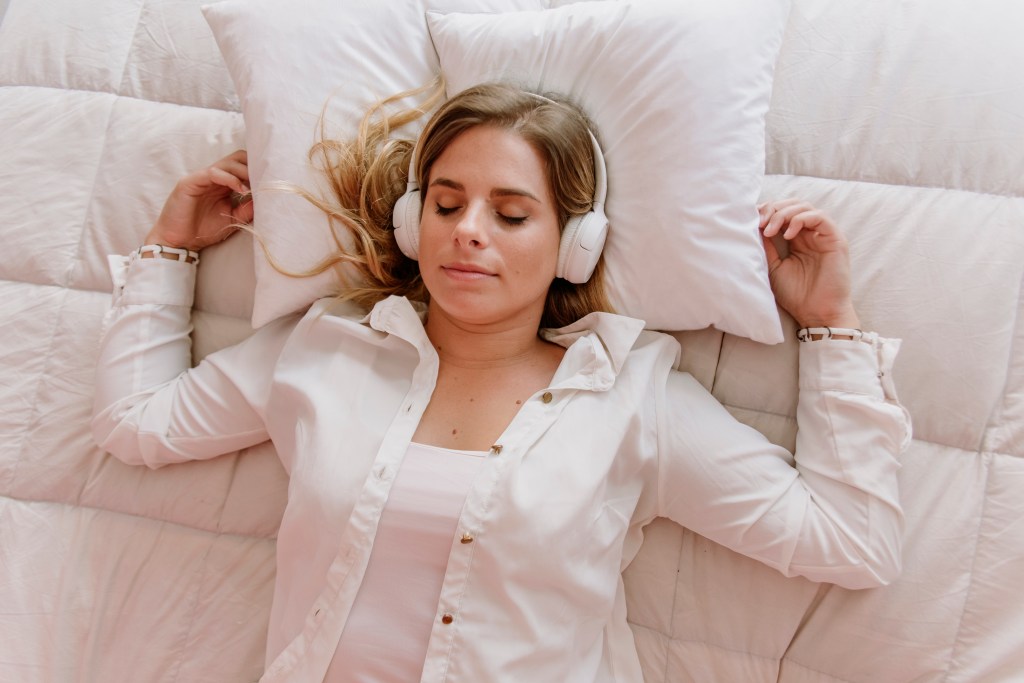Binaural beats while on the job is now the hottest hustle culture hack. The soundscapes have been proven to bring concentration and enthusiasts are claiming that listening to the sounds can reduce anxiety and even give users a natural psychedelic high.
What are binaural beats?
Binaural beats are an auditory illusion created by playing two different tones at slightly different frequencies into each ear. While the introduction of binaural beats isn’t new, there’s a renewed interest in the hack likely due to the rise of “hustle culture,” where people look for healthy ways to increase performance.
A binaural beats app typically lets users choose the sound range they want, or they offer pre-set sound mixes depending on what you want to achieve, whether that be a sharper focus, reduced anxiety or better sleep. Some apps even offer beats for greater creativity.
Some of these apps include Atmosphere, Brain Waves, Binaural Beats Therapy and BrainAural.
Do binaural beats work?
While enthusiasts claim that binaural beats have various effects on the brain and body, including improved cognitive performance, the scientific evidence supporting these claims has always been mixed.
But this week a new study dropped that supports the idea that binaural beats apps can actually make a difference.
Researchers Hyun-Woong Kim, Jenna Happe and Yune Sang Lee found that beta and gamma binaural beats do actually enhance auditory sentence comprehension.
The researchers said binaural beats have been shown to modulate various cognitive and psychological states. “We found that both beta and gamma binaural beats yielded better performance, compared to the baseline, especially for syntactically more complex object-relative sentences.”
In other words, listening to these sounds while trying to work or study can increase concentration in some circumstances. Hustle culture seems to have a new arrow in its quiver with this news.

Binaural beats are being used as digital drugs
In another quirky study, researchers in Melbourne decided to delve into the claim that listening to binaural beats can evoke psychoactive effects.
A study published in Drug and Alcohol Review gleaned data from the Global Drug Survey that found respondents used binaural beats to relax or go to sleep (72%) and to change their mood (35%). But the interesting part is that 12% said they were trying to get a similar effect to psychedelic drugs. It was the younger people surveyed that were most interested in this.
Dr Monica Barratt of RMIT University in Melbourne is the study’s lead author who said the motivation to use binaural beats like this was more commonly reported among those who used psychedelics.
“Much like ingestible substances, some binaural beats users were chasing a high. But that’s far from their only use. Many people saw them as a source of help, such as for sleep therapy or pain relief.”
The audio tracks on the apps are often named to attract the people using drugs, for example, offerings include tracks named MDMA and cannabis.
How ‘digital drugs’ are being used
YouTube and Vimeo were the most popular way to listen, followed by Spotify, according to those surveyed. “Most respondents sought to connect with themselves or something bigger than themselves through the experience,” said Barratt.
“It’s very new, we just don’t know much about the use of binaural beats as digital drugs. This survey shows this is going on in multiple countries. We had anecdotal information, but this was the first time we formally asked people how, why and when they’re using them.”
Barratt also said that these apps challenge the definition of a drug.
“We’re starting to see digital experiences defined as drugs, but they could also be seen as complementary practices alongside drug use. Maybe a drug doesn’t have to be a substance you consume, it could be to do with how an activity affects your brain.”
This article was written while using an app called Brainwaves. While the author agrees that it did improve concentration, it also induced anxiety. Or, was that the three coffees consumed?





